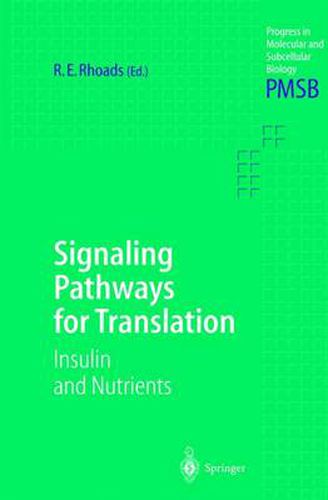Readings Newsletter
Become a Readings Member to make your shopping experience even easier.
Sign in or sign up for free!
You’re not far away from qualifying for FREE standard shipping within Australia
You’ve qualified for FREE standard shipping within Australia
The cart is loading…






This title is printed to order. This book may have been self-published. If so, we cannot guarantee the quality of the content. In the main most books will have gone through the editing process however some may not. We therefore suggest that you be aware of this before ordering this book. If in doubt check either the author or publisher’s details as we are unable to accept any returns unless they are faulty. Please contact us if you have any questions.
The articles in the present volume are by major contributors to our under standing of signaling pathways affecting protein synthesis. They focus pri marily on two extracellular anabolic signals, although others are included as well. Insulin is one of the best-studied extracellular regulators of protein syn thesis. Several of the known pathways for regulation of protein synthesis were elucidated using insulin-dependent systems. Regulation of protein synthesis by amino acids, by contrast, is an emerging field that has recently received a great deal of attention. The dual role of amino acids as substrates for protein syn thesis and regulators of the overall process has only recently been recognized. Since amino acids serve as precursors for proteins, one might expect that with holding an essential amino acid would inhibit the elongation phase. Surpris ingly, research has shown that it is the initiation phase of protein synthesis that is restricted during amino acid starvation. Understanding the mechanisms by which the biosynthesis of proteins is reg ulated is important for several reasons. Protein synthesis consumes a major portion of the cellular ATP that is generated. Therefore, small changes in protein synthesis can have great consequences for cellular energy metabolism. Translation is also a major site for control of gene expression, since messenger RNAs differ widely in translational efficiency, and changes to the protein syn thesis machinery can differentially affect recruitment of individual mRNAs.
$9.00 standard shipping within Australia
FREE standard shipping within Australia for orders over $100.00
Express & International shipping calculated at checkout
This title is printed to order. This book may have been self-published. If so, we cannot guarantee the quality of the content. In the main most books will have gone through the editing process however some may not. We therefore suggest that you be aware of this before ordering this book. If in doubt check either the author or publisher’s details as we are unable to accept any returns unless they are faulty. Please contact us if you have any questions.
The articles in the present volume are by major contributors to our under standing of signaling pathways affecting protein synthesis. They focus pri marily on two extracellular anabolic signals, although others are included as well. Insulin is one of the best-studied extracellular regulators of protein syn thesis. Several of the known pathways for regulation of protein synthesis were elucidated using insulin-dependent systems. Regulation of protein synthesis by amino acids, by contrast, is an emerging field that has recently received a great deal of attention. The dual role of amino acids as substrates for protein syn thesis and regulators of the overall process has only recently been recognized. Since amino acids serve as precursors for proteins, one might expect that with holding an essential amino acid would inhibit the elongation phase. Surpris ingly, research has shown that it is the initiation phase of protein synthesis that is restricted during amino acid starvation. Understanding the mechanisms by which the biosynthesis of proteins is reg ulated is important for several reasons. Protein synthesis consumes a major portion of the cellular ATP that is generated. Therefore, small changes in protein synthesis can have great consequences for cellular energy metabolism. Translation is also a major site for control of gene expression, since messenger RNAs differ widely in translational efficiency, and changes to the protein syn thesis machinery can differentially affect recruitment of individual mRNAs.